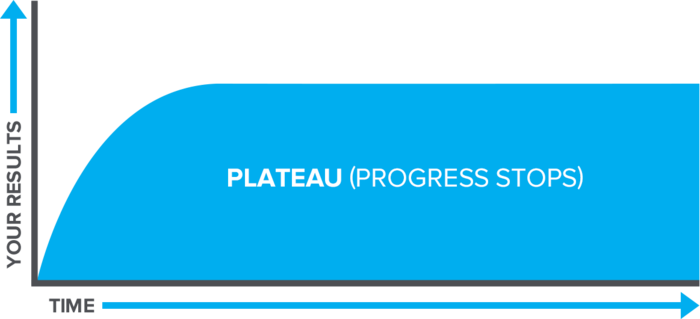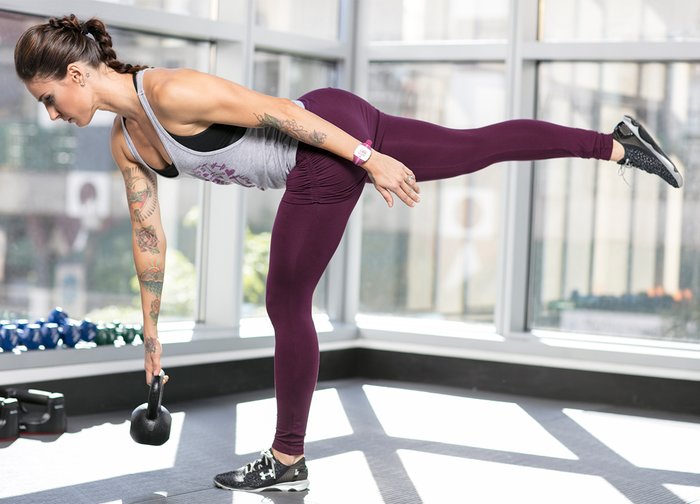Lifters tend to think their physique gets from here (current condition) to there (where we want to be) in a straight line, one that requires years to bridge.
But that's not how it happens—not even close. You make progress, hit a training plateau, and either find a way to overcome it or stall out. Most lifters reach numerous plateaus over time, and each presents a new challenge to be overcome.
What Is a Plateau in the Context of Lifting
Training plateaus are all about stress—too much of it, not enough of it, or too much of the same kind of it.
Offer the body too much stress, and it finds itself in a state of alarm rather than adaptation. Locked in survival mode, its resources are devoted to keeping the ship afloat rather than sailing toward the next training horizon. Strength gains halt, and it becomes increasingly difficult to lose much body fat.

Too little stress is also a problem. If you're not training hard enough to tell your body that what you're doing is important, it won't see a need to adapt. Like a rat on a wheel, you will go in circles, expecting change but only getting the same lackluster results. For example, think about the folks that have traditionally done only cardio work: What happens when they add in even a smidge of strength training? Their body changes.
Then there's the case of doing the same activity for too long. Once the body adapts to a given training stimulus, it needs something novel to drive further change. Like the guy at the gym whose been doing the same 5x5 workout since, like, 1991. His strength and physique gains probably leveled out somewhere around 1993, but he keeps on plugging away. This is an extreme example, of course, but the reality is that things need to change for the body to keep adapting.
That's not to say things need to change so frequently that the body doesn't get the chance to adapt; it needs continued input to learn that something is important. But every 4-6 weeks or so, some aspect of the program must be altered to keep the gains coming. Not grandiose, wholesale changes, but enough to cause the body to say, "Whoa, I gotta figure this out!"
5 Ways to Overcome Plateaus
Now let's cover a few strategies to climb over those plateaus. Each involves a different way of playing with training stress to get your progress back on track.
1. Rest
Listen, I'm not Johnny Raincloud trying to block your rays of sunshine, but we sometimes need to hear things we don't want to. And sometimes rest is the best plateau buster.

Maybe you've been training like a beast but are starting to lose your motivation. Maybe you feel tired and beat up all the time. Maybe improvements in your body and performance have ground to a halt. If your bodily systems are too stressed and fatigued, they're playing catchup too hard to allow you to demonstrate your strength or drop body fat. They need a minute to get some air.
So, if you've been training hard but aren't progressing, rest. Lower the activity and up the calories for a week. I'm not suggesting you eat like a 14-year-old with a tapeworm; keep to decent food, but lowering your training stress while simultaneously giving your body more calories will help you turn the corner.
2. Account for too much stress
You think training is special, but your body doesn't. To the body, stress is stress—no matter the source—and it wants to adapt to what it's being subjected to so that it can survive and eventually thrive. Your body doesn't recognize if the stress is from a barbell or an uncertain employment situation. It just knows when it's getting too much of it.
If you feel like you're stalling, take note of what's going on in your life outside the gym. What else in your life is stressing you out? Oftentimes, you don't consciously realize the subtleties of how bad relationships, job stress, and bad living situations affect you—but they take a big toll. Stress siphons off the resources you need to train hard and adapt to that training.
Take some time to sit down and consider what's going on in your life. Is it too difficult a time to train hard right now? If so, figure out if you need to change your training expectations, given the current reality. If you can cut out some crap from your life, that'll help decrease your stress load. And you should try to do that for your own piece of mind.
3. Reduce your rest periods between sets
Complacency is a sneaky devil that catches all of us from time to time. And when it does, we need something to jar us from our comfort zone. Shorter rest periods do just that.

If you haven't been tracking rest at all, start by giving yourself one timed minute between sets. You'll quickly come to the realization that you've been wasting a fair bit of time between sets, and you'll feel the needed stress of a faster-paced training session.
If you have been tracking your rest periods, start with a 10-15-second reduction between sets and see how you respond after a few training sessions. If it's not enough, knock off another 5-10 seconds. Do this for a few weeks to a month and you'll start getting your mojo back.
4. Change your lifting tempo
Sometimes, you just need to lift a little faster—or slower. If you've been training without regard for tempo, it could be the simple change that breaks your plateau.
Lighten up the loads and work on being fast. This is great for training the nervous system to increase its output. This is especially useful if your overall goal is absolute strength. Do this for 3-4 weeks, then come back to your regular training program.

If you've never tasted the sweet agony of slow negatives, they could be the elixir that elevates you past your plateau. Consciously elongate the eccentric portion of the rep to 3-5 seconds on your way to the lower end of the range of motion—especially on the bench press and squat and their variations. Not only will eccentrics train you to execute better form, they'll give your body the means for muscle growth and increased strength. Try this out for a few weeks, revel in the soreness, and then give your normal programming another shot.
5. Change your training style
Yep, this one's going to make you uncomfortable for a bit. If you've been doing the same type of training for more than two years, and the Gains Train is stopping at Plateau Station, try something different. Not a little different—completely different. If you're used to a powerbuilding-type training split, give kettlebells a try. If you've used only isolation machines for hypertrophy gains, grab some dumbbells instead. You need novelty to make progress. Make a change for 12 weeks, acknowledge what you've learned, and reassess your path to your training goals.

Keep Climbing!
Training plateaus are a certainty in a lifter's life, but they don't have to keep you stalled for long. The battle begins by taking stock of your training and life stress. If you're training is beating you down, rest. Got too much on your plate? Be realistic about your training expectations, and trim what's unnecessary from your life. Need some novelty? Play with training variables and styles to give your body something new.

